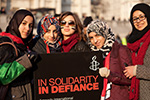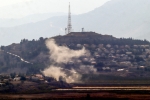Environmental Human Rights Defenders across Latin America face alarming threats and killings
People who speak up to defend air, water, land and forests are seeking to protect the rights and well being of their communities. They play a crucial role for the environment and all who depend on it.
Yet earth defenders are being “rewarded” with a terrifying increase in threats, attacks and killings.
Indigenous peoples and racial minorities face the greatest danger. Also at heightened risk are women earth defenders because in addition to challenging powerful economic interests, their outspoken efforts may transgress gender norms. Women defenders often face gender-specific rights violations including sexual violence and threats made against their children.
Research shows Latin America is the most dangerous region in the world to defend land, Indigenous rights and the environment.
In a report entitled They Spoke Truth to Power and Were Murdered in Cold Blood, UN expert Michel Forst says it is the responsibility of governments to protect environmental human rights defenders and address root causes of the violence, including:
Resource exploitation that fails to address the legitimate concerns and demands of local communities or the right to free, prior and informed consent.
Failure by companies to respect the rights of earth defenders to express dissent and oppose their activities.
Failure by States to communicate clearly the human rights obligations of business enterprises and sanction companies associated with threats to defenders.
Failure to investigate and bring to justice those who threaten or attack earth defenders.
In its 2017 report Global Witness, called Honduras the “deadliest place to defend the planet” with more killings of land and environment defenders per capita than any other country.
The 2016 assassination of Lenca Indigenous leader Berta Cáceres, amid efforts to stop construction of a hydroelectric dam project, is emblematic of the deadly violence.
Berta was awarded the prestigious Goldman Environmental Prize for her advocacy on behalf of communities opposing the damming of the Gualcarque River, considered sacred by the Lenca and vital to their health and well being. In Honduras, Berta got death threats as she continued to voice community opposition to the dam and was gunned down months later.
Since Berta’s assassination, dozens of other Indigenous rights, land and water defenders, have been attacked and killed in Honduras. Smear campaigns of false accusations are common, and often a precursor to physical attacks.
Lack of justice fuels more threats and attacks. But so too does corruption and flagrant violation of Indigenous rights when it comes to mining, logging and infrastructure projects that impact Indigenous lands and the environment. It is a recipe for more bloodshed.
LEARN MORE
Read our report: ‘We Are Defending the Land With Our Blood’
Read our blog In Honduras, our efforts help achieve important advances towards Justice for Berta
TAKE ACTION
- Sign our online action Honduras: Protect Defenders Under Attack
- Collect signatures on our Justice for Berta post cards
- Sign our online action Justice for Berta
- Letter Writing Action for Youth: Protect Defenders of the Earth
- Sign our online action to the Canadian government: Call on Canada For Policies to Protect Earth Defenders in Honduras
- Collect signatures on our print petition Honduras: Protect Land and Water Defenders
To create eye-catching action tables, download the following posters:
- Berta Caceres poster
- Canadian voices carry weight in Honduras poster
- Words of Berta’s daughter Laura poster
- Attacks continue against defenders who continue Berta’s work poster
For a powerpoint presentation with the photos and words of earth defenders in Honduras, contact campaigner Kathy Price
Defenders of land, Indigenous territory and the environment in Mexico face deadly violence. In 2018 alone, at least 21 defenders were killed, compared to just 3 murders in 2016. Together, Mexico and Colombia now account for more than half of the environmental human rights defenders killed around the world.
The escalation of killings in Mexico can be traced to the growth of organized crime, corruption among state officials, lack of effective investigations to bring the killers to justice, and inadequate protection measures for threatened defenders. Also to blame is the imposition of resource extraction projects without the free, prior and informed consent of affected Indigenous peoples, sowing conflict and violence.
The situation of Rarámuri Indigenous defenders in the Tarahumara Sierra of the northern state of Chihuahua is emblematic of a national crisis. As documented in our report Caught Between Bullets and Neglect, at least 10 Rarámuri defenders have been killed since 2015. They include Isidro Baldenegro, awarded a prestigious Goldman Environmental Prize for his efforts to protect pine and oak forests in the Sierra Madre, and community leader Julián Carrillo who expressed opposition to the environmental impact of a mine concession in the month before he was killed.
Despite a change in government in December 2018, attacks continue. The February 2019 murder of Samir Flores Soberanes underscores how dangerous the situation remains. Active in the Front of Peoples in Defense of the Earth and Water, Samir had been vocal in his opposition to a thermal-electric plant and pipeline project.
LEARN MORE
Read our report: Caught Between Bullets and Neglect
Read the moving blog: Julián Carrillo defended the forest with his life
TAKE ACTION
- Sign our online action Mexico: Protect Environment Defenders at Grave Risk
- Collect signatures on this print petition
- Sign our E-Action to Canada calling for policies to protect environmental human rights defenders in Mexico
Human rights defenders working on issues related to land, Indigenous territory and the environment in Guatemala, including the impacts of mining and hydro-electric dam projects, face a vicious circle of social stigma and criminalization through the justice system, as well as an increase in killings.
In 2018, 26 defenders were reported killed, an increase compared to previous years.
A contributing factor is the disturbing willingness on the part of public officials to discredit human rights defenders in the eyes of the public with false accusations. Public statements labelling environmental human rights defenders as “terrorists”, “opponents of development” and “enemies of the state” create stigma and hostility that encourages physical attacks.
This has a particular impact on women defenders because of traditional gender roles.
Meanwhile, misuse of the justice system for baseless legal action continues to intimidate, harass, wear down and unjustly imprison earth defenders. The rights and protection of entire communities is impacted as a result.
LEARN MORE
- Read our report: ‘We Are Defending the Land with Our Blood’
- Read Mining in Guatemala: Rights at Risk
- Read Land, Environmental Activist Killings Surge in Guatemala: report
- Read Guatemala: Amnesty International declares Bernardo Caal Xol a prisoner of conscience
TAKE ACTION
- Sign our E-Action Guatemala: Free Indigenous Prisoner of Conscience Bernardo Caal Xol
- Support the other actions call in for the relase of Bernardo Caal Xol in this activism blog
- Sign our E-Actioncalling on Canada to implement policies to protect earth defenders at risk in Guatemala
The hashtag used on social media by countless grassroots organizations says it all: #NosEstanMatando. They are killing us.
Colombia is one of the most dangerous countries in the world to defend land, Indigenous territory and the environment – and the danger is growing. Together with Mexico, Colombia accounts for more than half the defenders killed around the world.
Since the signing of a peace agreement in 2016, Colombia has witnessed a dramatic increase in the number of killings, threats and intimidation of human rights defenders, particularly those involved in conflicts over land and the natural resources found there.
Indigenous peoples and Afro-descendant communities are a frequent target and the impact is devastating.
Colombia’s Constitutional Court has warned that armed conflict, displacement, and the imposition of resource extraction projects threaten the very survival of more than a third of Colombia’s Indigenous peoples.
Yet the bloodshed continues, fuelled by knowledge that perpetrators of threats and attacks are rarely prosecuted.
LEARN MORE
Read our latest report Why Do They Want To Kill Us? Lack of Safe Space to Defend Human Rights in Colombia
Read an Op Ed by our Colombia researcher entitled We Must Protect Those Defending Land and the Environment in Colombia – or read the Spanish version published in El Pais
Read the conclusions of the UN Special Rapporteur for human rights defenders following his visit to Colombia
Read our story blog The defenders of this river are under attack and here’s why action from Canada is vital
TAKE ACTION
Sign our E-Action calling on Export Development Canada to provide remedies for its investment in a disastrous dam
Sign our E-Action Colombia: Protect Human Rights Defenders
Order our free RIOS VIVOS post cards to protect the rights and safety of threatened river defenders >> email ncameron@amnesty.ca
Collect signatures on our print petition: Colombia: Stop the Killings
Collect signatures on our print petition: Canada: Defend Defenders in Colombia
Sign our E-Action calling on Canada to implement policies to protect earth defenders at risk in Colombia
Defenders of land, Indigenous territory and the environment put their lives on the line in Ecuador.
Throughout 2018, Amnesty International documented a series of attacks and threats perpetrated against women earth defenders of Mujeres Amazónicas, a collective seeking to protect the Amazon region and the health of communities living there from the destructive impacts of extractive industries. Women environment defenders face extraordinary risks not only because they are confronting powerful economic interests but also because their outspoken efforts defy traditional gender roles.
Mujeres Amazónicas and other organizations have raised concerns about intrusions of the state into the territory of the Sápara People for future oil extraction and government bids for oil extraction in the territory of the Kichwa People of Sarayaku without obtaining their free, prior and informed consent.
Women earth defenders have also raised concern about an escalation of sexual violence against Indigenous women that has coincided with expanding resource extraction projects.
LEARN MORE
Read the April 2019 report “They will not stop us” Ecuador: Justice and protection for Amazonian Women, defenders of the land, territory and environment”
Read the August 2018 Open Letter signed by Amnesty International, Amazon Watch, Accion Ecologica, the Ecumenical Commission for Human Rights and Fundacion Pachamama
TAKE ACTION
Sign our e-action calling on authorities to stop attacks on women defending the Amazon
Write a letter or tweet your concern, following the instructions in this activism blog: Ecuador: Press Authorities to Uphold their Promises to Protect Amazonian Women Rainforest Defenders
Download this print petition for tabling
RESOURCES FOR ACTIVISM
Download our posters to raise awareness and inspire action in solidarity with the defenders of Mujeres Amazónicas.












